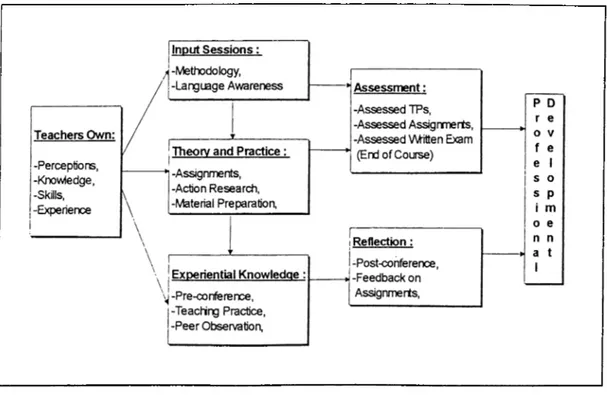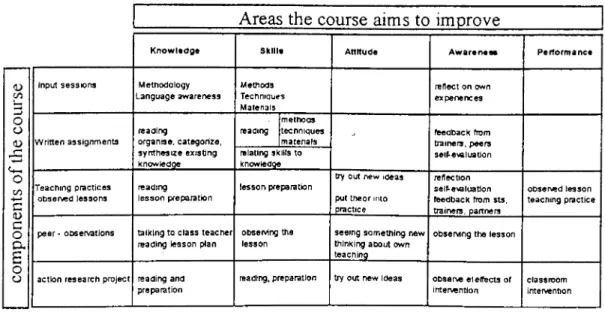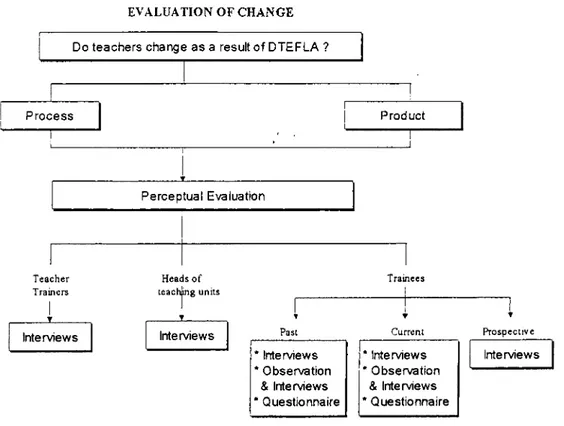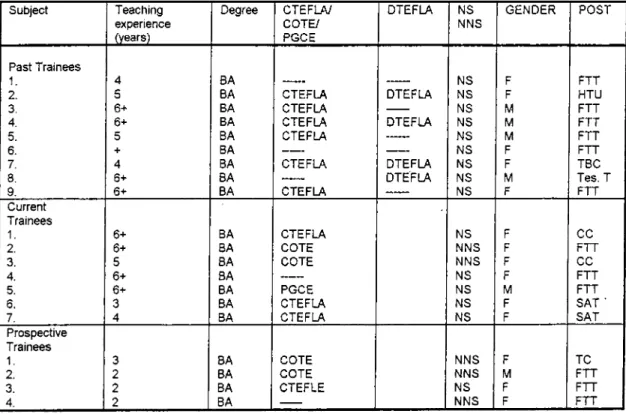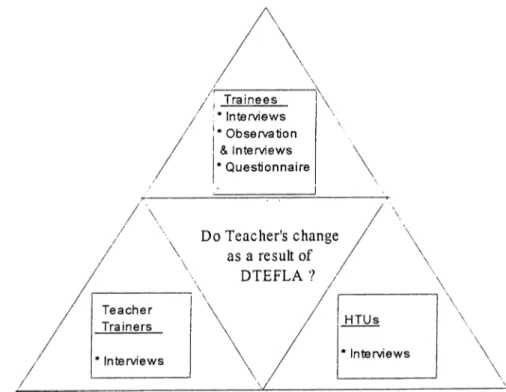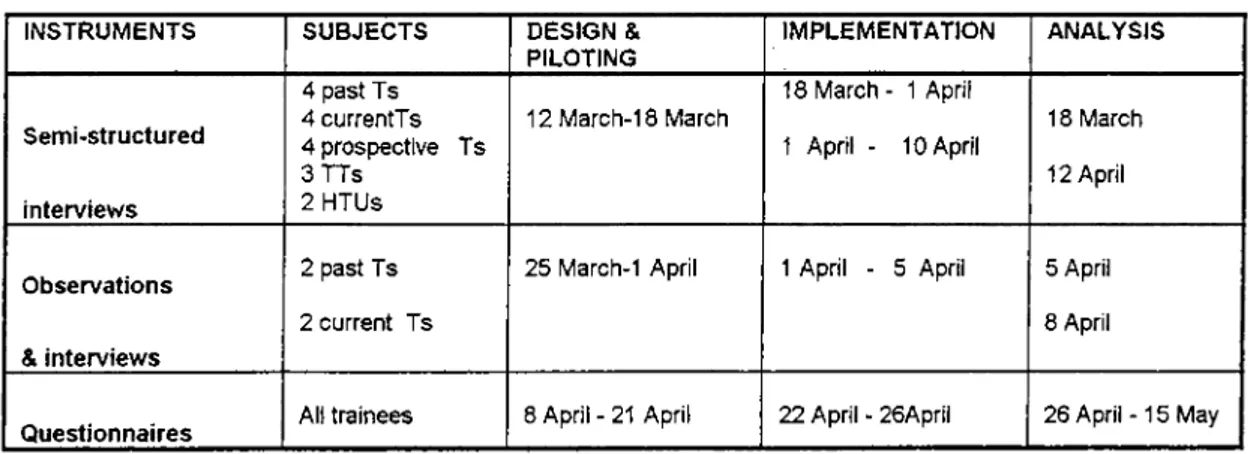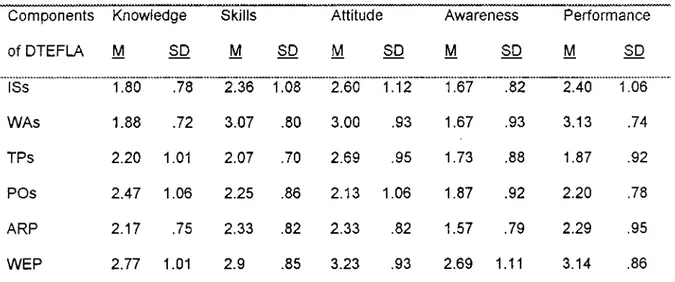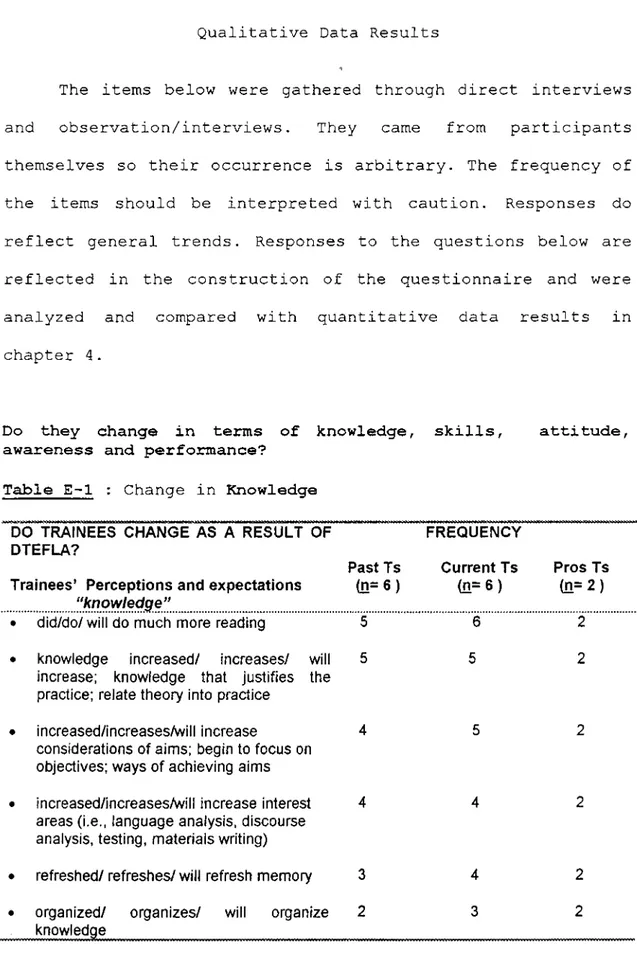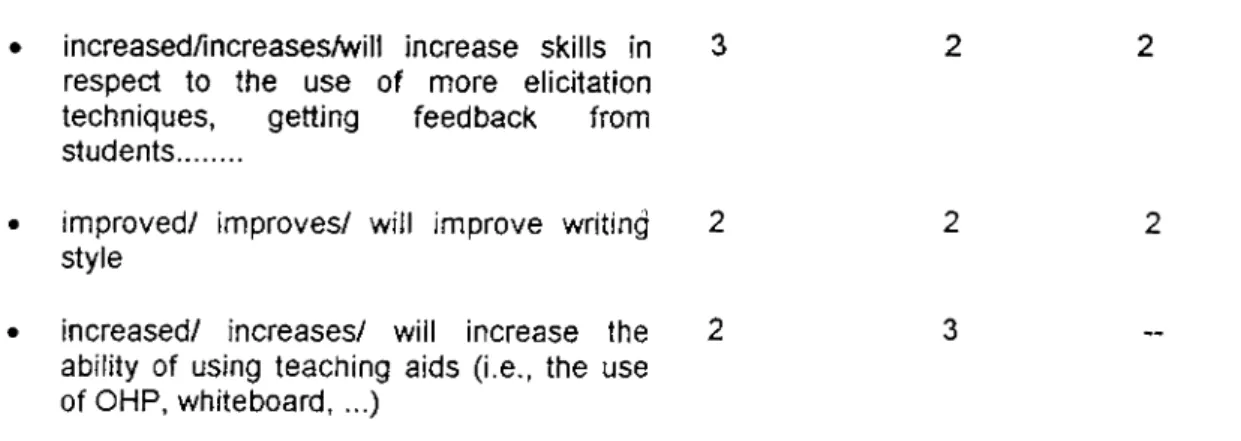9 s m с QÊ ^
ГГГ
Пм
ГП
/
'f
"Ч
Щ
^®
(5
(7
7
ηΐ
ψη
^4
?
і^ іч щ , ** - 7" - ■ . ^ ■ /- :д - .: 'Г ^' і,1 йД i ^.: ä U :,lv •/= ···Z ül
İ Ç
Ш
п
Ш
з
'
Ш
І
w
r«
f îi
jjö
O : İ
Ç Ш
КЙ
Z
^ j.
■
щ
т
Ж
І'
il
Ш
1Ш
Ш
?І
Ш ΐ
P i ¡ r rf » *·^ · ' ■/ ^ с сг ^ ^ ¡ ^ iï ïi Sf ei îe Ш іт
ш
т
^
Ж
і и
ши
! ш
ш ш
і
з
ш
AND p e r f o r m a n(:e
A THESIS PRESENTED BY
■ NEZAKET oZGiRiN
TO
THE INSTITUTE OF ECONOMICS AND SOCIAL SCIENCES IN PARTIAL FULFILLMENT OF THE REQUIREMENTS
FOR THE DEGREE OF MASTER OF ARTS IN TEACHING ENGLISH AS A FOREIGN LANGUAGE
BILKENT UNIVERSITY JULY, 1996
^ . N e z a U t iarofindcji^
knowledge, skills, attitude, awareness and performance
Author :
Thesis Chairperson :
Thesis Committee Members:
Nezaket Ozqirin Ms. Bena Gul Peker
Bilkent University, MA TEFL Program. Dr. T. S. Rodgers,
Dr. Susan D. Bosher,
Bilkent University, MA TEFL Program.
This study was designed to investigate the effectiveness
of an in-service course - DTEFLA at Bilkent University School of
English Language (BUSEL); the extent to wliich Lhe training
course promotes changes in trainees' levels of ''knowledge",
"skills", "attitude", "awareness" and "performance".
Both qualitative and quantitative evaluation procedures
were used to answer the question. The qualitative data were
collected through direct interviews and observation/ interviews
which were categorized and analyzed together. The quantitative
data were gathered through four-item Likert-scale questionnaires
which were administered to past, current and prospective
trainees. Both process and product-oriented evaluation features
were included and the evaluation model developed for this study
was called "perceptual evaluation" because data collected relied
mainly on trainees' self-evaluation/reporting skills.
The subjects were 16 trainees who took the DTEFLA course
from trainees, trainers and heads of units for the purpose of
triangulation.
The results of the data show that.^ teachers think they
changed in the focus areas of the study. Knowledge and awareness
were the most improved areas, whereas attitude was the least
improved. Some of the factors which affected the level of this
change were teachers' motivational factors to do the course,
their professional characteristics, and the written exam results
(pass/fail) of the trainees. The most influential motivational
factors for trainees to do the DTEFLA course were professional
development, personal development and better opportunities.
People who do the course for professional development reported
more change than the others in general and those motivated by
professional development and personal development seem to
benefit from the course more than the others. The common
professional characteristics of DTEFLA people were reported as:
willingness to try out new ideas, positive attitude to learn and
strong expectations. Written exam results was another factor
which affected teachers' perceived levels of change. There was a
particular difference in trainees' perceptions of change in
terms of different years and pass/fail rates. There were also
common factors like environmental issues; conditions (time
knowledge, skills, awareness and performance, attitude appears
to be a different issue and is more influenced by factors not
directly related to training. Trainees develop a more positive
attitude towards students and teaching, but it is the area where
trainees report the least change. The results show that the
DTEFLA course given at BUSEL is both a training and a
development program. By and large trainees feel the course to be
MA THESIS EXAMINATION RESULT FORM
July , 1996
The examination committee appointed by the Institute of Economics and Social Sciences for
the thesis examination of the MA TEFL Student
Nezaket Özgirin
has read the thesis of the student. The committee has decided that the thesis
of the student is satisfactory.
Thesis Title
Thesis advisor
Committee Members
Effectiveness of DTEFLA. Do teachers change as a result of an in-service ,training course?
Dr. Theodore S. Rodgers
Bilkent University^ MA TEFL Program
Dr. Susan D. Bosher
Bilkent University^ MA TEFL Program
Ms. Bena Gül Peker
We certify that we have read this thesis and that in our
combined opinion it is fully adequate, in scope and in quality, as a thesis for the degree of Master of Arts.
Susan D. Bosher (Committee Member)
9
Approved for the
Institute of Economics and Social Sciences
Ali Kariosmanoglu Director
ACKNOWLEDGEMENTS
I would like to express my gratitude to Dr. Theodore S.
Rodgers^ my thesis advisor, for his invaluable encouragement,
guidance and contributions to my thesis. I would also like to
thank my thesis committee members, Ms Bena Gül Peker and Dr
Susan D. Bosher for their constructive guidance throughout this
study.
I would like to express my special thanks to Simon Phipps,
the director of the DTEFLA course who provided me with all the
necessary materials, information and motivation, to Deniz
Kurtoglu Eken and Marion Engin, DTEFLA course tutors, for their
support and help, and to heads of teaching units for their
participation in the study. Finally I would like to express my
deepest gratitude to all DTEFLA trainees for giving up their
precious time to cooperate in this study. Without them this
study could never have been completed.
Finally, thanks go to my family and friends for their
patience and understanding throughout the program, especially to
LIST OF TABLES
CHAPTER 1 INTRODUCTION... 1
Statement of the Problem... 3
Context ... 3
Background to the S t u d y ... 6
Purpose of the Study... 8
Significance of the Study ... 8
Research questions... 8
Definitions of terms. . . . "... 9
Teacher Training - Development - . . . . 9
Education Effectiveness... 10
Evaluation - Assessment - Testing. . . . 11
CHAPTER 2 LITERATURE REVIEW ... 14
Teacher Training or Teacher Development . . . 14
Different Models of Teacher Training... 16
What can Training d o ? ... 20
DTEFLA as a Teacher Training Program . . . . 22
Expected Change ... 25
Evaluation... 2 6 Evaluation and Research... 26
What should be e v a l u a t e d ... 27
Definitions of Evaluation... 30
Evaluation Approaches... 31
Self-evaluation... 33
Previous Program Evaluations ... 36
CHAPTER 3 METHODOLOGY ... 40 Introduction... 40 Design of the S t u d y ... 41 Description of Subjects ... 42 Past Trainees... 43 Current Trainees ... 43 Prospective Trainees ... 44 Teacher Trainers ... 44 Heads of U n i t s ... 44 S e l e c t i o n ... 45 I n s t r u m e n t s ... 46 Direct Interviews ... 47
Observation and Interviews ... 48
Questionnaires ... 50
Procedures... 51
How and When Tools were administered . . 51 What Subjects d i d ... 51
L i m i t a t i o n s ... 53
Analysis of Data... 53
Qualitative Data Analysis... 54
Quantitative Data Analysis ... 54
CHAPTER 4 RESULTS OF THE STUDY... 55
Overview of the S t u d y ... 55
Results of Data Analysis... 56
Expected Changes ... 58
Perception of Experienced Change . . . . 60
Components of DTEFLA and Their Influence on " C h a n g e s " ... 63
Factors affecting perceived Change: 66 A. Motivation in Taking DTEFLA . . . 66
Course B. Professional Characteristics. . . 70
C. DTEFLA Exam Results and Change. . 72 General Teaching Aspects and their Use in Own Teaching... 7 4 Summary of Results 77 CHAPTER 5 CONCLUSION... 7 9 Overview of the Study . . . ... 79
General Results ... 80 Discussion... 81 L i m i t a t i o n s ... 82 Implications... 83 REFERENCES... 84 APPENDICES... ... 91
A-1. RSA/DTEFLA Syllabus... 91
A-2. BUSEL/DTEFLA Syllabus... 92
B. Past and Current Trainee Questionnaires. . 93 C. Prospective Trainee Questionnaire... 100
D. Interview Questions... 107
D-1. Past, Current Trainee Interviews . 108 D-2. HTU Interview... 109
D-3. Prospective Trainee Interview. . . 110
D-4 . Teacher Trainer Interview... Ill E. Qualitative Data R e s u l t s ... 112
3. 4 . 5. 6. 7 .
8
.The Summary of Qualitative Data Results of. "Experienced Change".
Results of Qauantitative Data which Show the "Experienced Change" as Perceived by Past and Current Trainees.
The Relationship between the Components and. Constituents of DTEFLA from Trainees' and Trainers' point of view
61
63
Course Component Influences on Trainee Changes. .
The Sequence of most Influential Motivational. . Factors.
Perceived Changes Plotted against the ... Motivational Factors; Personal Development,
Professional Development and Better Opportunities,
The Most Common Professional Characteristics. . Past, Current, Prospective DTEFLA Trainees have.
Reported "Change" in DTEFLA Trainees' Knowledge, Skills, Attitude, Awareness and Performance in terms of Years and Pass/Fail rates.
10. Teaching Aspects Stressed in the DTEFLA Course. Directly and the use of those in Trainees' Own Classes . 64 65 68 69 71 .73 ,75
LIST OF TABLES IN APPENDIX E
E-1 Change in Knowledge - Trainees' Perceptions
E-2 Change in Knowledge - Teacher Trainers' and HTUs' perceptions
E-3 Change in Skills - Trainees' Perceptions . . . .
E-4 Change in Skills - Teacher Trainers' and HTUs'. . perceptions
.112
. 113
, 113
E-5 Change in Attitude - Trainees' Perceptions...114
E-6 Change in Attitude - Teacher Trainers' and HTUs'. . .115 perceptions
E-7 Change in Awareness - Trainees' Perceptions... 116
E-8 Change in Awareness - Teacher Trainers' a n d ... 116 HTUs' perceptions
E-9 Change in Performance - Trainees' Perceptions . . . . 117
E-10 Change in Performance - Teacher Trainers'... 117 and HTUs' perceptions
E-11 Trainees' Perception of the influence of "Input . . . .117 Sessions" on change
E-12 Trainers' Perception of the influence of "Input . . . .118 Sessions" on change
E-13 Trainees' Perception of the influence of "Teaching. . .119 Practices" on change
E-14 Trainers' Perception of the influence of "Teaching. . .120 Practices" on change
E-15 Trainees' Perception of the influence of "Written . . .120 Assignments" on change
E-16 Trainers' Perception of the influence of "Written . . .121 Assignments" on change
E-17 Trainees' Perception of the influence of "Exam... 121 Practice" on change
E-18 Trainers' Perception of the influence of "Exam... 122 Practice" on change
E-19 Trainees' Perception of the influence of "Peer... 122 Observations " on change
E-20 Trainers' Perception of the influence of "Peer... 122 Observations" on change
E-21 Trainees' Perception of the influence of "Action. . . .123 Research Project " on change
Research Project" on change
E-23 Motivational Factors: Trainees' P e r c e p t i o n s ... 123
E-24 Motivational Factors: Trainers' P e r c e p t i o n s ... 124
E-25 Overall Feelings about the C o u r s e ... 125 "Past Trainees"
E-26 Overall Feelings about the C o u r s e ... 126 "Current Trainees"
E-27 Overall Feelings about the Course ... 127 "Prospective Trainees"
LIST OF FIGURES
FIGURE PAGE
1. The Components of DTEFLA . . . . . . .. . . . . . . 23
2. The researcher's interpretation of t h e ... 24 relationship between the components and
constituents of DTEFLA
3. Design of the Study... 41
4. Description of Subjects...42
5. The Design of the Instruments... ' ... 4 6
"Teaching is a complex interaction of many poorly specified and little understood variables.'"
(Weller, 1971)
One of the most discussed and studied subjects of
education is the act of teaching and learning. Even though
it has been explored extensively, successful teaching is
still a mystery for us. Educational evaluation is one field
which has attempted to shed light oh this mystery. But is
evaluation itself a clearly understood concept?
As Nunan says,"Making judgments and evaluations is an
integral part of everyday life" (1992, p.l84). This concept
is supported by many researchers in different words. For
example;
Evaluation is a natural activity; something that is very much part of our daily existence. It is
something that can be very formal or informal. It is also something that may not always be made explicit but may actually be undertaken unconsciously. (Rea- Dickins 6c Germaine 1992, p. 4)
It is clear that evaluation is a feature of everyday social
life, but we do not customarily make evaluative judgments in
a principled and systematic way. Educational evaluation
requires more than informal judgments or assessment of
learner outcomes.
Following a well-established increase in attention to
evaluation in general education, there is now growing
many contexts still is. According to Murphy (1993), the
functions of evaluation may be to as^şess accountability or
cost effectiveness, or attainment matched to normative goals
(often done through testing). Another function may be
development of the current system, where evaluation is often
conducted in a goal-free approach to establish whether what
is being done has value particularly from the participants'
point of view. The developmental approach to evaluation did
not emerge until the 1970s (Murphy 1993, Rea-Dickins 1993);
the relative value of these different approaches is still
debated.
Older studies often compared alternative approaches to
teaching (Scherer & Wertheimer, 1964) or results of
particular projects, for example, the Pennsylvania Project
(Clark, 1969); the Bangalore Project (Beretta & Davies,
1985). More recent evaluation studies widen considerably the
focus of evaluation, reflect a more democratic and
participative approach to evaluation and include a range of
both quantitative and qualitative dimensions. We have, for
example, the studies of Mitchell et al. 1981; Parkinson et
al. 1982; Mitchell 1990, 1992; Anivan 1991; Alderson and
Beretta,1992; Weir and Roberts, 1994; and Thames Valley
evaluation ( in Rea-Dickins, 1993).
For years, a large number of teachers have been
receiving some form of training, but, as Rea-Dickins (1993)
states, it is not known whether the classroom practice of
these teachers actually changes as a result of this training.
In other words, we do not know whether or not teachers make
use in their classes of some of the skills developed during
their training. In order to answer these questions, some sort
of évaluation which goes 'beyond the numbers game' (Rea-
Dickins, 1993) is needed.
Statement of the Problem
My proposed research attempts to examine how a
particular teacher training program affects the teaching of
its graduates. The study focuses on the extent to which an
in-service course at BUSEL (Bilkent University School of
English Language) promotes changes in trainees' levels of
knowledge, skills, attitude, awareness, and performance.
Context
Bilkent University School of English Language (BUSEL) is
a preparatory school where students are trained for an
advanced level of English and prepared for academic skills
needed for the faculties of Bilkent University. One of the
(Royal society of Arts - University of Cambridge Local
Examinations Syndicate) training courses, such as COTE
(Certificate of Teaching English for Overseas Teachers), DOTE
(Diploma of Teaching English of Overseas Teachers) or DTEFLA
(Diploma for Teachers of English as a Foreign Language). The
teacher trainers (all approved by the RSA), are responsible
for giving in-house RSA courses as well as INSETS (testing,
writing, language awareness, materials design and writing...)
and for providing professional support to individuals. The
above figures on staff involvement in training show that
BUSEL is a dynamic, innovative institution which gives
importance to the development of its teachers.
The in-service course that I will focus on is the RSA/
UCLES DTEFLA - a course for native speakers of English and
for speakers who have a standard of English both written and
spoken, equivalent to that of an educated speaker for whom
English is a first language. UCLES specifies that every
DTEFLA course should consist of 100 hours of input in
methodology and language awareness which can be covered
intensively in 8 weeks or extensively over 9 months depending
on the centre where it is run. It takes the provision of
specialized training of teachers in EFL as its objective and
aims to increase the competence of those engaged in the
world to a common standard leading to an internationally
recognized teaching qualification (RSA/DTEFLA booklet 1995).
The objectives of the course are summarized by International
House, one of the prime DTEFLA training institutions, as
being:
• To prepare teachers suitably for both the practical and written parts of the RSA DTEFLA examination, • To give teachers an opportunity to examine and
develop their awareness of teaching and learning, especially in areas of metnodology, materials and language analysis,
• To demonstrate how teaching can be effectively informed by theoretical considerations,
• To generate potential interest in further study. (Lowe ,1988, p .51)
DTEFLA, as offered at BUSEL, is an eight month course
(September-June) for native and non-native teachers with at
least two years teaching experience. It consists of 150 hours
of input in methodology and language awareness, 6 Teaching
Practices (TPs) observed by course tutors, 10 methodology
assignments, peer observations and an action research project
which are all internally assessed, and 2 3-hour written exams
and 2 practical exams which are externally assessed at the
end of the course.
BUSEL has been offering DTEFLA for three years, before
which, the course was conducted by the British Council (BC).
Because nearly all participants were teachers from BUSEL, the
BC and BUSEL decided three years ago to run the course
increased to 150 and trainees were given a non-teaching day
for sessions and pre-or post-conferences for TPs. What is
more, the school agreed to pay the course fees, and both
native and non-native speaker teachers were admitted to the
course, after a selection process comprising a written test
and oral interview. The importance given to trainee feedback
and the changes made shows the value BUSEL assigns to DTEFLA
and the benefits it hopes to. gain from it.
Background to the Study
BUSEL, as I mentioned before, offers support and
training to all members of staff according to their needs as
developing professionals, in order to improve their
knowledge, skills, attitude, awareness and performance. The
school supports DTEFLA trainees in terms of time and money as
mentioned above. As the school is committed to improving
standards of teaching and learning, it seeks to know how
effective the training courses are in meeting these
objectives. Trainees also need to know how the course will
benefit them, and they may then, in fact, gain more from the
training programs as a result. If we consider both the school
and trainees as 'customers' receiving the service provided by
As an EFL teacher who has done an in-service course at
BUSEL (DOTE), I have an intuitive feeling that the training
courses helped me become more "effective" in terms of
increasing confidence and performance in class, in lesson
preparation and ability to assess student performance.
However, these are only personal ideas and feelings which are
not based on any research. Oldroyd and Hall (1991) state that
evaluation must be "systematic rather than haphazard and
based on interpreted evidence rather than intuition or
impression"(p.155). Do we really know if teachers change
after training courses and, if so, how they change and how
this 'change' affects their students? It is difficult to
claim that teachers should attend courses in order to improve
their level of knowledge, skills, attitude, awareness, and
performance without having any reliable data as to whether
this, indeed, happens.
One of the school's aims is to raise the profile of the
DTEFLA option both within and outside the school so that it
can contribute to the improvement of general ELT standards in
Turkey (BUSEL Development plan, 1995-98). This aim
underscores the question of whether the DTEFLA course does in
fact help teachers improve their teaching behaviors and if it
chosen as the focus for this study because BUSEL is investing
heavily in this course. It is timely to inquire how well the
course achieves its aims and the extent to which the course
promotes changes in trainees' levels of knowledge, skills,
attitude, awareness, and performance.
Significance of the study
The results of this study can benefit
• the institution (to provide data on the usefulness of the course)
• course designers and trainers (to make necessary changes for the future of the course)
• future trainees (to raise their awareness about the course and to focus their own expectations)
• other training courses (to validate ways of checking the expected 'change' in trainees)
Research Questions
The question this study attempts to answer is :
Do teachers change as a result of the DTEFLA in
-service course?
When we break down the question, we consider the following
sub-questions:
l.What changes do teachers expect to occur in their knowledge, skills, attitude, awareness and performance
change in terms of knowledge, skills, attitude,
awareness and performance during and after the DTEFLA course and to what extent do teacher trainers and HTUs perceive those changes?
3. T0 what extent do the different components of the course influence the perceived "changes"?
Note. The components are Input Sessions (ISs), Written Assignments (WAs), Teaching Practices (TPs), Peer
Observations (PO), Action Research Project (ARP) and Written Exam Practice (WEP)
4. What factors affect perceptions of change:
a. Motivational factors of trainees in taking the
DTEFLA course?
b. Professional characteristics of trainees? c. Course results of trainees? (fail/pass)
5. What general teaching aspects do trainees recall were covered in the course directly and how do trainees use those teaching aspects in their own teaching?
"Change" in these questions refers to the changes reported
by trainees themselves in the focus areas. This depends on
'self-evaluation' or 'self-reporting' , terms which will be
used interchangeably for this study.
Definitions of Terms
Some of the terms related to major concepts of the
study require clarification.
Teacher Training - Development - Education
These terms have often been used interchangeably.
However, the most suitable definitions for the aim of this
an increase in knowledge and skills , and argues that these
can be taught by direct intervention; they are trainable. It
is based on an assumption that through mastery of discrete
aspects of skills and knowledge, teachers will improve their
effectiveness in the classroom. Freeman claims that while
there is no doubt that training is often effective, it has
clear shortcomings, and "development", which he defines as
attention to attitude and awareness, also needs to be
addressed.
He characterizes development as an expansion of skills
and understanding. The purpose of development is for the
teacher to generate change through increasing or shifting
awareness. In development, the trainer's role is to trigger
change through the trainee's awareness, rather than to
intervene directly as in training.
"Education" is used as a broader concept covering the
functions of training and development in his definition. For
the purpose of this paper I argue that teacher training
comprises more than improved knowledge and skills and should
include changes in attitude and awareness as well.
Consequently, the aim of any training course should be to
include the characteristics of development mentioned above.
Effectiveness
In order to understand what 'effectiveness' of a
training programme for language teachers means, it will be
defines it as a decision-making process based on four
constituents :
• knowledge (the what of teaching, including subject matter,
knowledge of students, of the sociocultural and institutional context),
• skills (the how of teaching , including methods, techniques
and materials),
• attitude (an affective stance towards self, activity, and
others which links internal dynamics and external performances), and
• awareness ( the quality of attention given to these - a trigger necessary for growth and change).
We may also add performance (the outcome of all these in
active teaching) as the fifth constituent, as it can be
observed and might give some idea of the teacher's ability to
reflect all four constituents mentioned above. We should
expect to see the same foci in teacher training programs. We
can claim that an effective program mirrors the
characteristics above and promotes changes in teaching
behavior in these five areas. Effectiveness,.therefore
comprises knowledge, skills, attitude, awareness, and
performance.
Evaluation - Assessment - Testing
Although evaluation and assessment are related and are
often used interchangeably, they mean rather different
things. Evaluation is often contrasted with testing or
assessment of learners (e.g. Brindley, 1989), even though it
is more useful to regard testing or assessment as one of the
tools of evaluation. Assessment data can tell us what
evaluation data can tell us why objectives have or have not
been met^ and can inform decisions related to future
modification. As Nunan (1988) says:
The data resulting from evaluation assist us in deciding whether a course needs to be modified or altered in any way so that objectives may be
achieved more effectively.. . . Evaluation ^ then^ is not simply a process of obtaining information ^ it is also a decision making process. (Nunan^ 1988^ p.118)
Evaluation is, therefore, a somewhat broader concept and may
or may not include assessment data. Like 'teaching',
evaluation is also defined as an on-going decision-making
process. It can be claimed that both are innovatory and
require planned changes. It has been argued that continuous
evaluation must be. an integral part of training programs in
order to improve delivery and thus improve learning. Sharp
distinguishes evaluation from testing by saying;
Both may use similar methods^ but the information is likely to be put to different uses: tests may
provide diagnostic evidence about students' work^ but evaluation is meant to provide a basis for future decisions about course planning and implementation. Evaluating a course by testing students has clear limitations. (Sharpyr 1990^ p. 132)
Evaluation is, therefore, to be distinguished from both
assessment and testing. This study will involve evaluation,
and will not use any assessment or testing data.
In the next chapter, the relevant research literature
is reviewed starting with general background views on teacher
training and models of teacher training. The chapter
continues with discussion of the effectiveness of teacher
in-service training course at BUSEL. It also focuses on the
kinds of "change" that training courses cause, general
outcomes and attempts to evaluate this change. Relevant
notions of evaluation are examined from different
perspectives including the importance of evaluation and
CHAPTER II. Literature Review
How effective is the DTEFLA course at BUSEL in terms of
promoting changes in teachers' levels of knowledge, skills,
attitude, awareness and performance? This study relies on
trainees' self evaluation and perceptions of the change they
undergo as a result of the training course. As background for
this type of evaluation, I will review models of teacher
training and different methods of evaluation. I will also
look at the DTEFLA course as a training program and outline
changes that might be expected to occur in participants.
Teacher Training or Teacher Development?
As mentioned earlier, teacher training, teacher
development and teacher education are sometimes used
interchangeably (Fanselow & Light, 1977; Larsen-Freeman,
1983; Stern, 1983; Strevens, 1981). Freeman (1982,1989)
suggests a distinction between the two functions "training"
and "development" within the general process of language
teacher education. For him, "education" is the superordinate
term, whereas teacher training and teacher development are
used to describe the strategies by which teachers are
educated. By "training" he means an increase in knowledge and
skills, but "development" defined as attention to attitude
and awareness also needs to be addressed.
Prabhu (1987), reported in Matthews makes a distinction
between "equipping" (short term aims of immediate concerns to
and growth), which can be compared with Freeman’s training
and development. According to Prabhu, (in Matthews, 1992);
Equipping means providing the teacher with
knowledge and skills for immediate use. Enabling^ on the other hand assumes that the demands in the future will he varied and unpredictable^ and that the teacher will have to meet these demands. What is important ^ therefore^ is to develop the
learner * s capacity to meet and adapt to emerging demands. (Matthews^ 1992^ P-9)
O ’Brien (1986) cited in Matthews defines teacher
development as:
A life-long^ autonomous process of learning and growth^ by which as teachers we adapt to changes in and around us and enhance our awareness^ knowledge and skills in personal^ interpersonal and
professional aspects of our lives. (Matthews^ 1992^ P-9)
All these definitions and ideas show us that 'training',
in the pure sense, is now seen by itself as not sufficient.
Training is seen ”as a limited - and possibly limiting - word
that runs the risk of techniques and procedures that may be
no more than a bag of tricks" (Duff, 1988, p.lll). The idea
of training seems to be inadequate when the wider concepts
involved in teacher education and teacher development are
considered.
Having reviewed different notions of training and having
indicated that teacher training should be more than
developing knowledge and skills, it is felt that any training
course should improve the learner’s capacity to meet and
adapt to changing demands. It might be difficult for a one
mentioned above, yet we can assume that an "effective
training course" should open the way through an ongoing
process of awareness-raising and should start the process of
change for long term professional and personal development.
If training programs are limited to "knowledge and skills" or
"theory and, practice", they may not necessarily help teachers
to become thinking, reflecting and questioning professionals
who can improve student learning. It may be difficult to call
these kinds of training programs "effective".
Different Models of Teacher Training
As mentioned previously (p.lO) training is used as an
umbrella term which includes the characteristics of teacher
development and teacher education for this study. Before
looking at what training can do, it is important to examine
different models of teacher training as suggested by various
writers. There are numerous models available.from general
education to ELT, such as; Nichol (1993), Hirst (1990), but
for the purposes of this study the focus will be on those
suggested by Wallace(1993), Larsen-Freeman (1983), Pennington
(1989) and Richards and Nunan (1990).
In reality most training programs seem to be similar
without conforming directly to any one of the models below.
As Waters (cited in Bax 1995) says;
The model of teacher education programs in many training institutions tends to be one directional.- trainees come to receive wisdom from the lips of
'^experts' then take their handed down knowledge and skills home for implementation. (Bax^ 1995^ p.263)
The dangers of such a model have been accepted by most
educators as stated on pp.14-15. To counter these problems,
most training institutions have made strenuous efforts in
recent years to refine their approach, shifting from a
'teacher education' model (in a narrow sense) or 'teacher
training' model to a 'teacher development' one. (Richards &
Nunan, 1990; Swan, 1993; Matthews, 1992).
Larsen-Freeman (1983) believes that
what is needed is a holistic approach to teacher education which goes beyond training to prepare an individual to function in any situation^ rather
than training for a specific situation ...
preparing people to make choices" (p. 265) .
Some, such as Fanselow (1977), advocate a competency-based
approach for training teachers. These two approaches are
compared by Pennington as follows:
Two Approaches for Training Teachers
Holistic vs Competency“based Personal development Creativity Judgment Adaptability Component skills Modularized components Individualization Criterion-referencing (Pennington, 1989, p.93]
She also advocates a training program for ESL/EFL in which
methodology is introduced after several phases aimed at
"attitude adjustment": The stages are; • Educational awareness
• Self awareness • Student awareness • Methods and materials
The goal of such a model is "to shape or reshape the
classroom performance” (from relatively narrow, mono-cultural
attitudes to the broader, multicultural perspective).
(Pennington, 1989, p-95)
Wallace (1993) posits three models of teacher education:
the craft model : which represents a process where expertise in the craft is passed on from generation to generation.
the applied science model:which represents the received knowledge component of teacher education where the
teacher trainer serves as transmitter of knowledge and the trainee is to be educated.
the reflective model: which emphasizes the experiential component of teacher education where the trainer works as a catalyst, collaborator, and facilitator and the trainee is a person who develops.
Richards and Nunan (1990), however, distinguish two main
approaches for teacher education programs;
a micro approach to the study of teaching which looks analytically at teaching in terms of directly observable characteristics (performance).
a macro approach which makes holistic generalizations and inferences that go beyond directly observable classroom behavior.
The former perspective approaches training needs of teachers
as discrete and trainable skills (such as arranging classroom
activities, using different strategies for error correction
and elicitation), whereas the latter approaches development
as educating the teacher on concepts and thinking processes
that guide the effective language teacher. In order to
achieve this teaching practice, observing experienced
way the trainee gets deeper awareness of the principles and
processes and through assignments, workshops and discussion
activities can begin to see the theory behind, the practice. Breen, Candlin, Dam, and Gabrielson (1989), give an
example of a training program which "underwent a gradual
transition from training as transmission to training as
problem-solving, and finally to training as classroom
decision-making and investigation as a result of ongoing
course evaluation. This process is an example of the changed
perception of needs of the trainees and the subsequent
improvement of a training program.
The common characteristics of most approaches discussed
above can be summarized as relating theory to practice
through observation and discussion of one's own teaching
(reflection), and raised awareness. A compound model which
shares different features of the models discussed above might
be thought of as follows:
• relating theory into practice • reflection and self-evaluation • raised awareness
• critical thinking for further development
Until this point the focus has been on different models
of teacher training. The question now raised is whether
What can Training do?
Having established that an effective training program
should combine theory and practice with reflection, raised
awareness and thinking about further development, let us now
turn to what training can do and what outcomes can be
expected from training courses.
When talking about development, the characteristics of
individuals need to be taken into account. Stiggins and Duke
(1988) state that no matter how ample the support from
supervisors and peers, teachers are unlikely to experience
professional development unless they are willing to take
advantage of opportunities for growth. In their case studies
they identified certain teacher characteristics that appeared
to be related to professional development. These are:
• Strong professional expectations
• A positive orientation to risk taking • Openness to change
• Willingness to experiment in class • Openness to criticism
The characteristics referred to most in the literature
on professional development are orientation to risk taking^
openness to change^ willingness to experiment^ and openness to criticism (Duke & Stiggins, 1990, p.l21).
We know that teachers respond to professional
development or training opportunities differently. Joyce and
McKibbin (in Duke & Stiggins) identified five distinct
Omnivores - people who use every available aspect of the formal and informal systems that are available to them, and tend to be happy and self-actualizing.
Active consumers - people who take advantage of many (but not all) opportunities for growth and who
occasionally initiate activities.
Passive consumers - people who are there when opportunity presents itself but' who rarely seek or initiate new activities.
The resistant - people who are unlikely to seek out training unless it is in areas where the already feel successful.
The withdrawn - people who avoid virtually all growth- oriented activities. (Duke & Stiggins, 1990, p.l22)
Different motivations for undertaking a course should be
taken into consideration as well as individual differences
and different responses. If trainees are forced to take the
course or if their expectation is only to get a certificate
in order to find a better job, then it is likely that there
will be different outcomes and reactions to development or
change. We cannot, therefore, expect to see the same sort of
development or uniform changes in all trainees.
The observable change or development is another factor
to consider. While there might be less clear change in
already competent teachers, some teachers might reflect
change more quickly. Brumfit (1979) states:
Training can help prepare a teacher^ but it can not make one^ and no one should expect a student to be a competent teacher immediately on leaving a
training course, (p.3)
What training can try to do is to create a teaching attitude
of being organized, of always probing and trying to improve,
and of refusing to follow fashions without good reason. Such
a course will attempt to promote positive attitudes towards
about teaching thus enabling continuous professional
development to take place. These can be offered as legitimate
expectations from any effective training course. As can be
seen on pp.16-19, Brumfit's expectations of professional
development match the common features of any training model.
Since the effects and time of development vary from person to
person, the outcome (change or development) will also vary.
DTEFLA as a Teacher Training Program
In order to compare the.DTEFLA course at BUSEL with the
models mentioned above we need to examine its content and
aims. The content of the course is designed according to the
requirements of the RSA/UCLES (Royal Society of Arts/
University of Cambridge) DTEFLA syllabus (see appendix A)
considering the needs of BUSEL. When we examine the course
components (Figure 1) it can be seen that the course not only
focuses on theory and practice but also on experiential
knowledge and self reflection. It would, therefore, appear to
correspond to the proposed model on p.l9. Firstly, t-rainees
evaluate their own performance with peers and course tutors
who have observed their teaching. They observe their
colleagues and think about their own teaching while analyzing
the observed lesson. Thirdly, they talk to their course
tutors about their own performance at pre- and post
conferences and compare their own perceptions about the
All these components aim to help trainees raise their
awareness and change their attitude, as well as improve their
level of knowledge and skills. Figure 2 shows the
researcher's interpretation of the relationship between
course components and areas the course aims to improve -
knowledge, skills, attitude, awareness and performance. The
evaluation data will hopefully tell us which components of the course promote changes in the trainees. It will also
indicate if there is a mismatch between trainees' perceptions
and trainers' perceptions of expected changes in terms of
knowledge, skills, attitude, awareness, and performance even
though the latter is not one of the research questions
addressed in this study.
Figure 1 : The Components of DTEFLA
(Author's interpretation of DTEFLA descriptive material of
Areas the course aims to improve
Knowledge Performance
Input sessions Methodology
Language awareness Methods TechniQues Matenais reflect on own expenences Written assignments reading organise, categorize, synthesize existing knowledge_________ reading methods techniques matenais relating skills to knowledge_____ feedback from trainers, peers self-evaluation Teaching practices observed lessons reading lesson preparation lesson preparation
try out new ideas put theor into practice_________ reflection self-evaluation feedback from sts, trainers, partners observed lesson teaching practice
peer - observations talking to class teacher
reading lesson plan
observing the lesson
seeing something new thinking about own teaching____________
observing the lesson
action research project reading and
preparation
reading, preparation try out new Ideas observe el effects of
intervention
classroom intervention
Figure 2 : A possible interpretation of the relationship
between the components and constituents of DTEFLA
The course aims are wider than the syllabus itself. They
are described by Lowe (1988, p.58) as follows:
• a broader awareness of issues and rationales. • a more integrated conceptual framework for an
understanding of the teaching/learning process. knowledge)
• a development of many of the skills and attitudes that will benefit them in their lives generally.
Having in mind the definitions of training and the aims
of the DTEFLA course, it can be claimed that the DTEFLA is a
training and development course as it aims at developing
awareness and attitudes as well as knowledge and skills as
discussed on p.l4. Lowe (1988) says the RSA/ DTEFLA is a
course of education (in the broader sense) rather than
training which is felt to be a necessary precondition of an
effective education program (p.lO). This study intends to
find out how the course objectives are met by the DTEFLA
course at BUSEL and how particular components cause changes
Expected Change
Having defined DTEFLA as a course which aims at an
improvement in teachers' knowledge/ skills, attitude,
awareness, and performance we would expect to see a change in
teachers' performance as an outcome of the course. For Fullan
and Hargreaves (1992) successful change involves learning how
to do something new. Before dealing with evaluation models,
the concept of "expected change" needs to be clarified. It
has already been discussed that some teachers undergo or
reflect variable kinds of change according to their
personality or attitude. But what kind of a change is
expected as a result of the DTEFLA■course?
In a course the trainee and the trainer engage in a
process, the purpose of which is to generate some form of
"change" in the trainee. Freeman (1989) says the purpose of a
course is to moderate aspects of the teacher's decision
making powers based on knowledge, skills, attitude, and
awareness. In order to qualify this idea of change he
proposes four points:
• Change can mean a change in awareness (does not mean doing something differently). It can be an
affirmation of current practice: the teacher is unaware of doing something that is more 'effective'. • This change is not necessarily immediate or complete.
Indeed, some changes occur over time, with the trainer serving only to initiate the process, (see p.21 )
• Some changes are directly accessible by the trainer and therefore are quantifiable, whereas others are not. For example, although the number of techniques used by the teacher to correct errors can be
measure directly.
• Some types of change can come to closure and others are open-ended, i.e. the number of correction
techniques one teacher will use is finite; however, triggering in the teacher the desire to-continue to explore new correction techniques is a qualitatively different type of change. It is open-ended. (Freeman 1989, p.38)
In brief, the 'change' mentioned above is difficult to
measure and can not be seen clearly either by trainers or by
trainees in all aspects at a certain time. For example, it
will be difficult to evaluate the open-ended changes which
Freeman proposes. This study is, therefore, interested in the
"changes" the teacher is aware of and the changes which can
be observed by trainers and heads of teaching units (HTUs) at
the time when the study is conducted.
Evaluation
Researchers who are interested in educational evaluation
accept that the history of evaluation can be traced as far
back as ancient Chinese civil-service exams and that
evaluation has been very closely associated with the
measurement tradition in psychology and education (Warthen
and Sanders cited in Lawrenz and McCreath, 1988).
Evaluation and Research
What is evaluation and how can we rely on the data
gathered from different sorts of evaluation instruments?
Popham (1975) argues that "evaluation differs from
the procedures of educational research (tests, assessment,
observation), information obtained from evaluation procedures
is used to improve educational practices rather than simply
describe them” (Richards, 1990, p.l7). On the other hand,
Nunan accepts evaluation as a kind of research believing that
"evaluations, incorporating as they do questions, data, and
interpretation, are a form of research" (1992, p.l84). This
study recognizes the importance of evaluation as a form of
research.
What should be Evaluated?
Some educators, such as Hudson (in Nunan, 1992), argue
that the measurement of student performance is the key to
program evaluation and that the essential question to be
asked by a program evaluator is "whether an examinee has
mastered the content he or she has been taught, or has
reached a level of competence" (p.l85). What Hudson focuses
on are the outcomes of the learning process rather than the
process itself. Some research shows that when teachers are
provided with in-service training, student achievement
improves significantly (Van der Sijde, 1992), but whether
improvement in student performance can be unequivocally
related to a specific program or training or a set of
materials is another and much more difficult question. Rea-
not possible to know what brought about the desired
improvement if the only data possessed is limited to test
results which do not tell why that particular result has been
obtained.
It is obvious that only looking at course results is an
insufficient attempt at program evaluation and does not tell
us anything about objectives and methods of a course. A
broader view to program evaluation comes from Sharp (1990),
who says:
. . . course evaluation, which includes the use of
many other strategies in addition to testing, will produce a greater variety of useful information
which might be used to justify expenditure, check whether course objectives are reasonable and attainable and provide a basis for decisions on curriculum improvement. (p.l32)
It is known that evaluation involves lots of factors,
but what should be taken into consideration for program
evaluation? Kirkpatrick (1976) suggests considering the
following areas for a program evaluation:
Reaction: the participants' opinion of the facilities, methods, content... etc.
Learning: the skills, knowledge and attitudes learned during the program.
Behavior: the change in on-the-job performance which can be attributed to the program.
Results: the effect on the organization of the changes in behavior, such as cost savings, increases in output.
(1976: p. 127)
This study directly or indirectly involves three of the areas
suggested by Kirkpatrick. These are: trainees' reaction,
suggested evaluating the components below which are similar
to Kirkpatrick's models:
Context evaluation: obtaining and using information on the operational situation in order to decide training needs and objectives.
Input evaluation: concerns making judgments about the alternative inputs to training.
Reaction evaluation: the same meaning with Kirkpatrick. Outcome evaluation: corresponds to Kirkpatrick's last three subjects and looks for evidence to find out what change has occurred. It is divided into three
subcategories; immediate, intermediate, and ultimate.
While the ultimate evaluation looks for answers to the
questions: How have the changes in job performance affected
the organization? Have ultimate objectives been met or not?
immediate and intermediate categories look for answers to the
questions: What changes have occurred in knowledge, skills,
and attitude? How can we measure changes? How can we be sure
that these changes are the result of the training?
The immediate and intermediate categories suggested by
Warr et al (1970) share the characteristics of this study,
which is mainly looking into the changes that the trainees
undergo as a result of the DTEFLA course. There are
particular problems measuring these outcomes because many
other factors besides training, such as organizational
climate, the influence of other people, and an individual's
Definitions of Evaluation
Brown (1989) defines program evaluation as a systematic
collection and analysis of all related information to promote
the improvement of a program, to assess its effectiveness and
efficiency as well as the participants' attitudes.
This definition is a modification of the previous ones and
includes different aspects of course evaluation. Sharp (1990)
differentiates between "classical' evaluation (initial,
formative, summative) and 'illuminative' evaluation (less
concern with measurement and prediction and more with
description and interpretation) .
Rodgers (1989) differentiates between conventional and
consultational models of program evaluation and says that the
conventional wisdom and practice in the areas of curriculum
development, program evaluation, and educational decision
making have recently come under increasing attack. For him,
"conventional evaluation is based on the hypothetico-
deductive paradigm of experimental science and dictates a
sequence of procedures to be followed in conducting an
evaluation"(p. 26). He explains the reasons for calling them
conventional by saying:
These views are conventional not only in the sense that they are discussed at conventions but in the sense that they have tended to be formal and quantitative (rather than qualitative and informal) . (p. 28)
He adds that hypothetico-deductive program evaluation "has
Lincoln, 1981) methods of program evaluation" (p. 28).
Rodgers concludes that current critics of the conventional
approaches to program evaluation tend to reject linear,
quantitative, top-down, participant-restricted models and
prefer more multidimensional, qualitative, interactive, and
participant-extended options.
Evaluation Approaches
Brown's definition of program evaluation seems to be
relevant for this study so it is important to know which
approaches are available in order to evaluate the DTEFLA
course. According to Brown (1989) there are four approaches
to program evaluation:
Product oriented approaches; those which focus on the goals and instructional objectives of a program with the purpose of determining whether they have been achieved.
Static characteristic approaches; 'professional judgment’ evaluations (Worthern and Sanders,1973). The static
characteristic version of evaluation is conducted by outside experts to determine the effectiveness of a particular
program.
Process-oriented approaches; meeting program goals and
objectives is indeed important but that evaluation procedures could also be utilized to facilitate curriculum change and improvement.
Decision facilitation approaches; aims to serve the purposes of decision makers.
Researchers differ in the definitions they give for
various evaluation concepts- Brown (1989) synthesizes several
existing possibilities and offers a useful model-for the
special problems of language program' evaluation. He discusses
several evaluation dimensions in respect to language
programs: formative vs. summative evaluation^ product vs.
process evaluation and quantitative vs. qualitative
evaluation. While these are offered as dichotomies, Brown
calls them dimensions and says "these can be complementary
rather than mutually exclusive”. (1989, p.229)
Formative vs. Summative :
Formative evaluation takes place during the development of a program and its curriculum, and the purpose is to gather information that will be used to improve the program. Summative evaluation often occurs at the end of a program, and the purpose is generally to determine whether the program was successful and effective.
Product vs Process :
Product evaluation can be defined as the evaluation whose aim is to find out whether the goals of a program are achieved. Process evaluation focuses on what is going on in a program as it moves towards its goals.
Quantitative vs Qualitative :
Quantitative data are gathered using measures which lend themselves to being turned into numbers and statistics. Qualitative data are generally observations or information gathered from open ended questionnaires or interviews that do not so readily lend themselves to becoming numbers and
statistics. Such data often lack credibility because they do not seem "scientific’, however it may turn out that this type of information can be more important to the actual decisions made in a program (Brown 1989, Rea-Dickins, 1992).
The quantitative/qualitative debate is going on in
evaluation circles. As House (1991) says, the
quantitative/qualitative debate is 'the most enduring schism
in the field.' Yin (1994) also states that the conflict
four approaches can be used by teachers to evaluate their
teaching and to gain awareness;
• observation of other teachers’ teaching, • self observation,
• action research, and • teacher journals.
All techniques, except journal-keeping are practiced in
the DTEFLA course so it is assumed that trainees are used to
evaluating their teaching and self reporting.
Rea-Dickins and Germaine define self evaluation as "the
practice of teachers reflecting on what has taken place in
the lesson with a view to improving their performance" (1992,
p.32). Britta and 0'Dwyer (1993) see self evaluation as a
means of promoting professional development amongst EFL
teachers and make a distinction between teacher self
evaluation and teacher evaluation by others. For them^ the
aim of self evaluation is consciousness-raising by bridging
the perceptual gap between actual and perceived classroom
performance. The aims mentioned above -clarify the place of
self evaluation in EFL teaching. Having in mind the
components of DTEFLA, it can be assumed that trainees have
been self evaluating their teaching in a systematic way.
Smith (1991) states that the correlation between the
trainee's and the trainer's evaluation is usually
surprisingly high as a result of familiarity with self-
evaluation throughout the course.
Self evaluation (especially self reporting) is an
'a procedure that is said to be both cost effective and
efficient' Richards (1990, p.l23). It gives teachers a chance
to see to what extent their assumptions about their own
teaching are reflected in actual teaching practices.
As previously mentioned, the study will mainly rely on
trainees' self evaluation so it is important to know how
reliable it is. In the past, the reliability of teacher self
reports might be presumed to be low (Good & Brophy in
Richards, 1990). But Richards claims that reliability can be
increased by using self report inventories that focus on
specific instructional practices. In this study, I will use
questionnaires which focus on specific skills and behaviors
in place of self-report inventories. Koziol and Burns (1986)
found out that when questions have a specific focus,
comparisons of the accuracy of teacher self reports with
observation reports made by outside observers have revealed
agreement around 75% of the time, (in Richards, 1990)
The kind of a course which is going to be evaluated and
the kinds of changes which might be expected as an outcome of
the course have been discussed . We can predict that it is
difficult to measure how much teachers learn from a course
and how much of this change they reflect in their teaching
behaviors. However, this study will attempt to find a
suitable way to evaluate the change in teachers knowledge,
skills, attitude, awareness, and performance as mentioned
through self evaluation. The comparisons of trainees'
